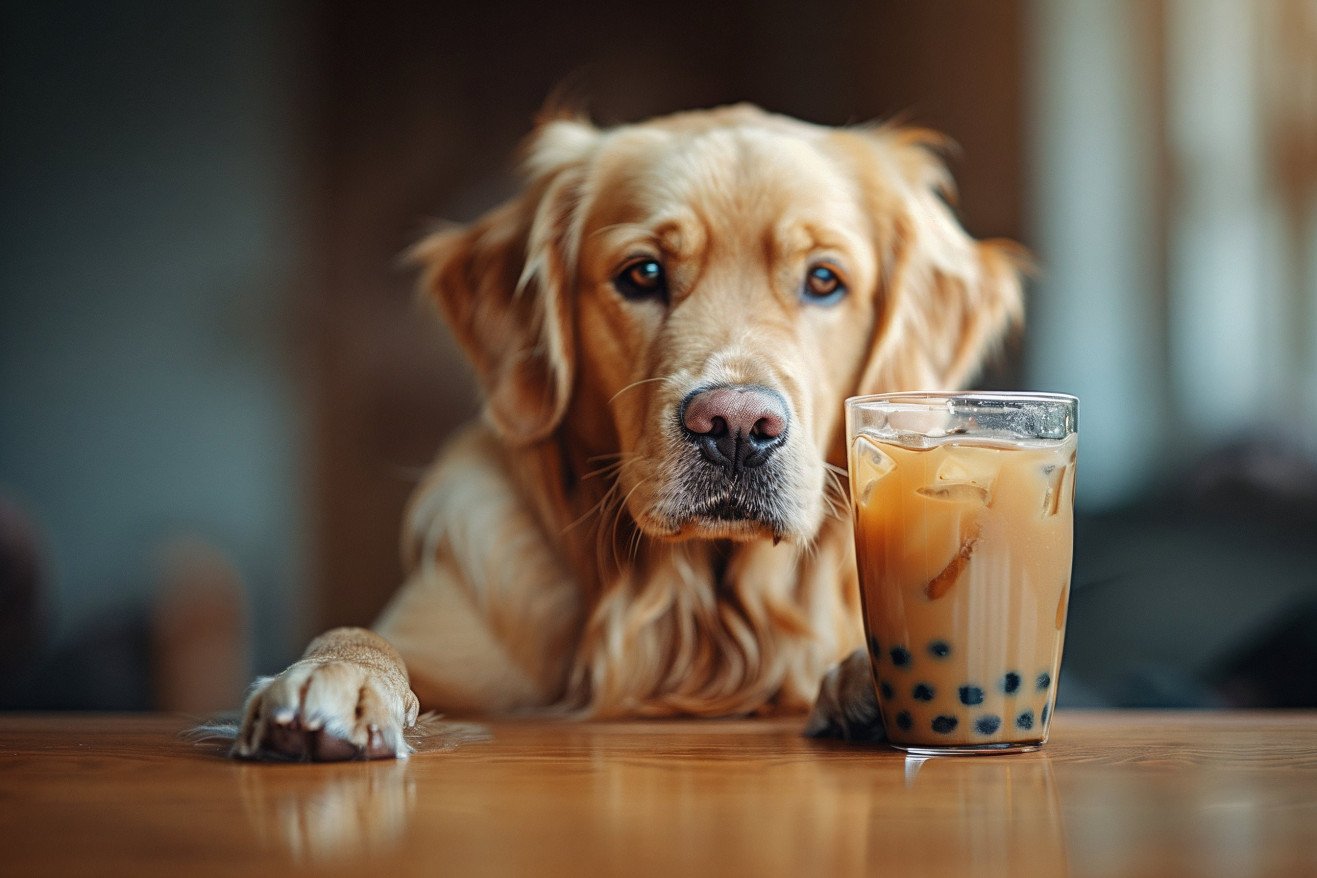Can Dogs Eat Boba? A Comprehensive Guide
26 May 2024 • Updated 25 May 2024

With the rise in popularity of boba tea, you may be wondering if the tapioca pearls and other ingredients in this popular beverage are safe for your dog to eat. While dogs can have cooked tapioca pearls in very small amounts, the high sugar content in the syrups, dairy, and risk of choking from the pearls make boba a potentially dangerous treat for dogs.
We'll take a deep dive into the latest veterinary nutrition studies and reference experts to give you a complete guide to the potential dangers and benefits of giving your dog boba. You'll learn about the nutritional content and serving sizes so you can decide whether to let your dog have a taste of your boba or stick to treats that are more suitable for dogs.
Can dogs eat boba?
Breaking It Down: What Makes Boba Bad for Dogs?
There are a number of ingredients in boba tea that can be harmful to dogs. The sugar in the syrups and sweeteners used to flavor boba tea can cause dogs to gain weight, develop dental problems like cavities, and even lead to diabetes in dogs, notes Buddydoc. Many boba teas also include caffeine from the tea, which is toxic to dogs in even small amounts, and can cause restlessness, an increased heart rate, and tremors.
Milk or dairy products, which are also often used in boba tea, can cause digestive upset, including vomiting, diarrhea, and stomach upset, in dogs that are lactose intolerant, which is common in adult dogs. The tapioca pearls are a choking hazard for dogs, especially small dogs, since the small, chewy balls can easily get stuck in a dog’s throat if they swallow them whole. Finally, the dyes and artificial flavors used to make boba tea more appealing can include substances that are toxic to dogs.
Tapioca Pearls: What Are the Risks?
The tapioca pearls in boba tea are the most dangerous part of the drink for dogs, and that’s because they can be a choking hazard and cause digestive issues. According to Dogster, the small, chewy balls can easily get stuck in a dog’s throat if they swallow them whole, especially for smaller dogs.
In addition to the choking risk, if the pearls aren’t cooked properly or are eaten in large quantities, they can also cause digestive issues or even blockages in a dog’s intestines. Atiliay suggests making sure the pearls are cooked all the way through so that they’re soft and translucent because if they’re undercooked, they can be hard for dogs to digest.
While tapioca is safe for dogs to eat in general, if it’s fed to them in moderation, Vetnoms points out that the starch and carbs in the pearls don’t have much nutritional value and can lead to weight gain if they’re eaten in excess. Plus, there’s no real reason to feed dogs boba or any of its ingredients.
If you want to feed your dog cooked tapioca pearls as a treat, Vetnoms says you should only give them a few at a time and make sure they aren’t flavored or sweetened or mixed with any other boba tea ingredients. Make sure to watch your dog for signs of an allergic reaction or stomach upset. However, it’s best to stick to a well-balanced, dog-friendly diet and talk to your vet before introducing new foods.
Boba as a Special Treat: Can You Find a Healthy Alternative?
While boba tea is not safe for dogs, there may be some potential for dogs to have boba or its ingredients as a special treat. According to Ollie Dog Food, plain, cooked tapioca pearls can be given to dogs in moderation, as long as they are cooked until they are soft and translucent. However, the article notes that tapioca pearls are not nutritious and can lead to weight gain if they are given to dogs too often.
For pet parents who want to see if there are any boba alternatives that are safe for their dogs, Camp Bow Wow has a recipe for a "Doggy Boba Tea" that is made with dog-safe ingredients like frozen fruit and plain yogurt. This version of boba tea doesn’t include the sugary syrups, dairy, or choking hazards that are found in traditional boba tea.
Of course, it’s important to talk to a vet before giving dogs any new treats or human foods, even in small amounts. As Vetnoms points out, it’s important to make sure that dogs are given treats in moderation and that the treats are portion-controlled to avoid potential health problems. If dogs do accidentally eat something they shouldn’t, pet parents need to be ready to act quickly.
Safety and First Aid: What to Do If Your Dog Eats Boba
If your dog eats boba or bubble tea by accident, it's important to act fast. According to the Cornell University College of Veterinary Medicine, the first thing you should do is call your vet or a 24/7 poison control hotline, like the ASPCA Animal Poison Control Center or Pet Poison Helpline. You will need to be able to tell them information about your dog, including their breed, age, and weight, as well as the symptoms they are experiencing and what they ate.
Your vet may tell you to make your dog vomit, but Happy Dog Training warns that you should only do this under the guidance of a professional. You can use a food-grade 3% hydrogen peroxide solution, giving 1 teaspoon for every 10 lbs of body weight. After giving the peroxide, walk your dog around or massage their abdomen to help mix the peroxide, and expect them to vomit within 15-20 minutes.
According to WagWalking, you should not induce vomiting if your dog has ingested a corrosive substance, if it's been more than 4 hours since they ingested the substance, or if they are showing signs of distress. In these cases, you should take your dog to the vet immediately.
Keep an eye on your dog for symptoms like vomiting, diarrhea, lethargy, or seizures, and be prepared to bring a sample of any vomit to the vet. Taking measures to prevent your dog from accidentally eating boba, like keeping it out of their reach and watching them closely, can help prevent these situations.
Conclusion: Make Sure You're Prioritizing Your Dog's Health and Well-Being
If your dog has consumed taro tea, it's important to act fast. In a JustAnswer post, a 65-pound dog had consumed about 2 cups of taro tea 10 minutes before the question was asked. Since all parts of the taro plant are considered toxic to dogs, it would be best to err on the side of caution and induce vomiting.
The recommended way to do this is with a 3% hydrogen peroxide solution, with 1 teaspoon per 10 lbs of body weight. PuppyTales recommends walking the dog or massaging the stomach to help the peroxide mix, and vomiting should occur within 15-20 minutes. If it doesn't, the dose can be repeated once safely.
That said, Tier1Vet warns against inducing vomiting at home without a vet's supervision because it can be risky. If the at-home method doesn't work, the dog should be taken to the vet immediately because they can use prescription drugs to induce vomiting much faster.
Make sure you're watching the dog closely for signs of distress, including seizures, lethargy, and if vomiting and diarrhea continue. Make sure you give the vet as much information as possible about the situation, including how much was consumed and when. Time is of the essence when it comes to potential toxin ingestion.


